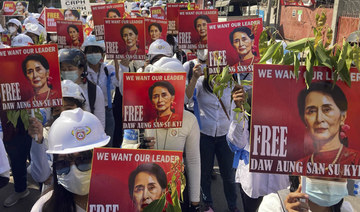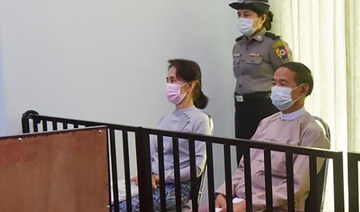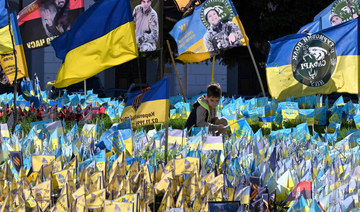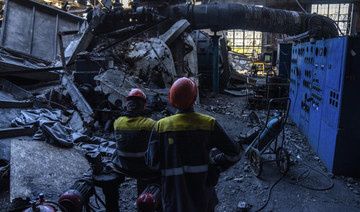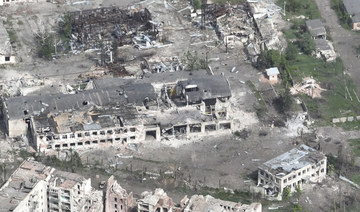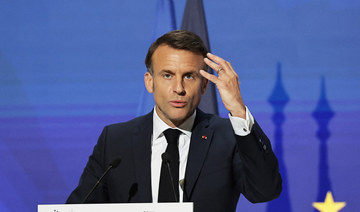BANGKOK: In sentencing Myanmar’s iconic democracy leader Aung San Suu Kyi to prison, the country’s generals have effectively exiled her from electoral politics. But that doesn’t mean the Southeast Asian nation is back to square one in its stop-start efforts to move toward democracy.
In fact, a younger generation that came of age as the military began loosening its grip on politics and the economy and has tasted some freedoms is well positioned to carry on the struggle.
A de facto coup on Feb. 1 pushed Suu Kyi’s elected government from power, throwing the country into turmoil. But erasing the gains of a decade of opening up has proved more difficult.
People took to the streets en masse almost immediately and have continued sporadic protests since then. As a military crackdown on demonstrations grew increasingly violent, protesters moved to arm themselves.
Within days, a mix of old and new guard, including elected lawmakers who were prevented from taking their seats by the takeover, announced a shadow administration that declared itself the nation’s only legitimate government. It was very consciously assembled to be a diverse group, including representatives of ethnic minorities and one openly gay member, unusual in socially conservative Myanmar.
It, not Suu Kyi, who was arrested in the takeover, has been at the forefront of the opposition — and has garnered significant support among the general population.
While no foreign government has recognized the so-called National Unity Government, U.S. national security adviser Jake Sullivan met virtually with two of its representatives. And it has accomplished a kind of standoff at the U.N., which delayed action on a request by Myanmar’s military government for its representative to take its seat. The country’s current delegate has declared his allegiance to the unity government.
“The coup and its aftermath are not so much the end of a democratization process in Myanmar as they are proof that democratization has actually taken hold of the younger generation,” Priscilla Clapp, who served as the U.S. chief of mission in Myanmar from 1999 to 2002. “In fact, the coup may ultimately prove to be the dramatic end to the older generation of leadership in Myanmar.”
The pro-democracy movement now faces the challenges of continuing to resist military rule, keeping up international pressure for restoring an elected, civilian government, and consolidating support from ethnic groups that have long fought the central government.
Suu Kyi, whose pro-democracy efforts won her the Nobel Peace Prize, and her allies have played important roles in the past, even when sidelined or jailed by the generals. On Monday, the 76-year-old was convicted on charges of incitement and violating coronavirus restrictions and sentenced to four years in prison, though that was almost immediately reduced to two. She faces other charges that could see her imprisoned for life.
But the younger generation may be better placed to carry the mantle anyway.
Unlike their elders, younger people in Myanmar, especially those in the cities, have spent most of their lives without having to worry about being imprisoned for speaking their minds. They have had access to mobile phones and Facebook and grew up believing the country was moving toward greater, not less democracy.
They also seem more willing to reach out to Myanmar’s ethnic minorities. Not only did the unity government include ethnic minority officials in its Cabinet, but it sought out alliances with the powerful ethnic militias, which are fighting for autonomy and rights over their resource-rich lands.
“Even as they are fighting against the military takeover, they are debating among themselves to determine the outlines of a new form of a more democratic and ethnically diverse political system,” said Clapp, who is also a senior adviser to the U.S. Institute of Peace and the Asia Society. “This did not happen with earlier rebellions against military rule before the people had experience with democratic institutions that gave the public a voice.”
Suu Kyi’s own reputation abroad was deeply marred by her seemingly condoning, or at times even defending, abuses committed by the military against the Muslim Rohingya minority while her government was in power. She disputes allegations that troops killed Rohingya civilians, torched houses and raped women.
The unity government has also been criticized for seeming to neglect the long-oppressed Rohingya, and it remains to be seen how its uneasy alliance with ethnic groups will play out.
But Suu Kyi’s handling of the Rohingya is just one element that complicates her legacy.
An icon of resistance during her 15 years under house arrest, Suu Kyi agreed to work alongside the generals after she was freed. It was a gamble that left Myanmar’s fledgling democracy in limbo, with the military keeping control of key ministries and reserving a large share of seats in parliament.
Some overseas admirers were disappointed that during its time in power Suu Kyi’s government used British colonial-era security laws to prosecute dissidents and critical journalists, in part of “an ongoing pattern of silencing dissent,” said Jane Ferguson, a lecturer at Australian National University.
In seizing power, the military claimed there was massive fraud in the 2020 election that saw Suu Kyi’s National League for Democracy win in a landslide. It said that justified the takeover under a constitution that allows it to seize power in emergencies — though independent election observers did not detect any major irregularities. Critics also assert that the takeover bypassed the legal process for declaring the kind of emergency that allows the army to step in.
Security forces have since quashed nonviolent nationwide protests with deadly force, killing about 1,300 civilians, according to a tally compiled by the Assistance Association for Political Prisoners.
Despite the risks, the verdict against Suu Kyi, who remains popular, provoked more spirited protests. In the city of Mandalay on Monday, demonstrators chanted slogans and sang songs popularized during pro-democracy protests in 1988.
“In Yangon, we are seeing local residents resume banging pots and pans late at night in protest,” said Jason Tower, Myanmar country director for the U.S. Institute of Peace. “These types of moves by the junta are also a key driver and motivation for local people to join people’s defense forces.”
Those forces, which began as a way to protect neighborhoods and villages from the depredations of government troops, are also being supported by the opposition unity government that hopes to turn them into a federal army one day.
In the meantime, the military will keep trying to “terrorize the public into obedience,” said Christina Fink, a professor of international affairs at George Washington University. “They have done so successfully in the past, but this time the opposition is more widespread and takes many different forms so it has been much harder for the regime to achieve its goal.”
Myanmar democracy in new era as Suu Kyi sidelined by army
https://arab.news/ckn3z
Myanmar democracy in new era as Suu Kyi sidelined by army
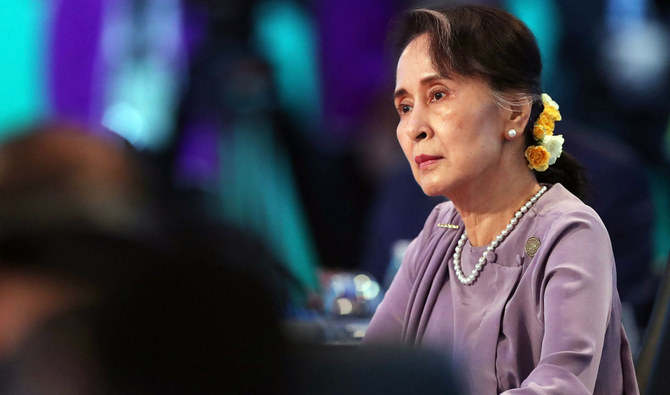
- Suu Kyi, whose pro-democracy efforts won her the Nobel Peace Prize, and her allies have played important roles in the past, even when sidelined or jailed by the generals
Russia’s FSB says it killed saboteur recruited by Ukraine

- The man was a Russian national recruited by Ukraine’s military intelligence to carry out the attack in the Leningrad region
- He had entered Russia from Lithuania in March after receiving training there
MOSCOW: Russia’s FSB state security service said on Friday its officers had killed a saboteur who had been recruited by Ukraine and was planning to attack a fuel terminal in northwestern Russia with explosives.
The FSB said in a statement the man was a Russian national recruited by Ukraine’s military intelligence to carry out the attack in the Leningrad region, and that he had been killed after shooting at security agents.
The FSB said he had entered Russia from Lithuania in March after receiving training there.
Vilmantas Vitkauskas, Head of the Lithuanian National Crisis Management Center, denied the allegation.
“Russia has been systematically conducting disinformation campaigns and provocations for a long time in order to raise tensions among societies and allies and to cover its aggressive actions,” he said.
“This disinformation spread by the FSB is a case in point. One of the objectives of such aggressive activities is to influence Lithuania’s support for Ukraine.”
There was no immediate comment by Ukraine, were Russian forces are waging war after Moscow’s full-scale invasion in February 2022.
Little hope of Ukraine breakthrough during Xi France visit: observers

- “France and the European Union expect him to use his influence on Russia, but Xi Jinping has nothing to offer on Ukraine,” said a former European diplomat
- Xi is due to make a state visit to France on Monday and Tuesday
PARIS: French President Emmanuel Macron will next week make a new push to try and dissuade China’s Xi Jinping from supporting Russian President Vladimir Putin’s war against Ukraine but is unlikely to make a breakthrough on ending the conflict during the visit, observers say.
President Xi’s visit is set to be rich on symbolism — with a sumptuous dinner at the Elysee Palace and a trip to the Pyrenees mountains planned — but risks being short on diplomatic success for the French leader.
“France and the European Union expect him to use his influence on Russia, but Xi Jinping has nothing to offer on Ukraine,” said a former European diplomat, asking not to be named.
Xi is due to make a state visit to France on Monday and Tuesday, followed by visits to Serbia and Hungary, two European countries retaining warm ties with Russia.
While Xi and Macron will discuss international crises, trade, climate change and cultural exchanges, the key aim will be to “point out that for Europe, the first issue with China is its position on Ukraine,” said a source close to the French government.
On a visit to China in 2023, Macron had already called on Xi to “bring Russia to its senses” over Ukraine and urged him not to deliver weapons to Moscow.
Little has changed, however. Xi will host Putin for talks in China later this month.
Macron, 46, indicated he had not given up on the idea of trying to get Xi, 70, on his side.
“It’s not in China’s interest today to have a Russia that destabilizes the international order,” the French president said in an interview with The Economist published on Thursday. “We need to work with China to build peace.”
European Commission President Ursula von der Leyen, who has urged Beijing to play a greater role in ending the Ukraine war, will join Macron and Xi for talks on Monday.
Macron has said he will ask the Chinese president to help him achieve that aim when he visits Paris, which is preparing to host the Olympic Games this summer.
There is a historic tradition that peace should reign during the Olympics — although the opening of the Games in Beijing in August 2008 did not halt Russia’s invasion of Georgia.
“On Ukraine, China has done nothing,” said Marc Julienne, director of the Center for Asian Studies at the French Institute of International Relations (IFRI).
In February 2023, China published a 12-point position paper on Ukraine, but it was rejected by Kyiv and its Western allies.
Beijing, which says it is a neutral party in the Ukraine conflict, has been criticized for refusing to condemn Moscow for its offensive.
The United States had accused China of helping Russia carry out its biggest militarization since Soviet times.
US officials say China has provided dual-use supplies that have let Russia regroup in the face of a long delay in US aid to Ukraine.
In April, US Secretary of State Antony Blinken said this included “machine tools, semiconductors, other dual-use items that have helped Russia rebuild the defense industrial base that sanctions and export controls had done so much to degrade.”
China has rejected the US claims as “groundless accusations.”
Macron, too, is expected to raise “concerns” about “the activity of certain Wuhan companies that could be directly involved in or contribute significantly to the Russian war effort,” according to a member of his team.
Beijing is a major supporter of the Russian economy.
China-Russia trade in 2023 reached a record $240 billion, according to customs data, overshooting a goal of $200 billion set by the neighbors.
Experts say Beijing is unlikely to renounce support for Moscow, which it sees as a priority partner in its opposition to the United States.
“Xi Jinping’s priority is the Global South,” said Emmanuel Lincot, a China expert at the Catholic University of Paris.
“There is a congruence in the Sino-Russian bilateral relationship, particularly in the desire to counter the West. Which is not to say that there is no rivalry.”
Human rights group begins legal action over UK’s Rwanda migrant policy

- The group said the government’s Safety of Rwanda policy document was inconsistent with the new law
LONDON: Human rights group Asylum Aid said on Friday it had launched a legal challenge to the British government’s policy of sending asylum seekers to Rwanda in the wake of a new law which seeks to pave the way for the scheme to be put into operation.
The group said the government’s Safety of Rwanda policy document, published on April 29, was inconsistent with the new law which was passed by parliament last month to override a ruling by the UK Supreme Court that the scheme was unlawful.
Britain sanctions Israeli groups, individuals for violence in West Bank

- The four individuals sanctioned were responsible for human rights abuses against Palestinian communities in the West Bank
LONDON: Britain on Friday imposed sanctions on two “extremist” groups and four individuals in Israel who it blamed for violence in the West Bank, its latest package of measures against Israeli settlers.
Britain’s Foreign Office named Hilltop Youth and Lehava as two groups which it said were known to have supported, incited and promoted violence against Palestinian communities in the West Bank.
The four individuals sanctioned were responsible for human rights abuses against these communities, the statement added.
Among them are Noam Federman, who has trained settler groups in committing violence and Elisha Yered, who has justified killing Palestinians on religious grounds.
Violence in the West Bank was already on the rise before Israel’s assault on Gaza, which was triggered by an Oct. 7 Hamas-led attack on southern Israel.
It has escalated since, with stepped-up Israeli military raids, settler violence and Palestinian street attacks.
British foreign minister David Cameron said extremist settlers were undermining security and stability and threatening the prospects for peace.
“The Israeli authorities must clamp down on those responsible. The UK will not hesitate to take further action if needed, including through further sanctions,” he said.
Those sanctioned will be subject to financial and travel restrictions. Britain previously imposed sanctions on four Israeli nationals in February.
Universities take steps to prevent pro-Palestinian protest disruptions of graduation ceremonies
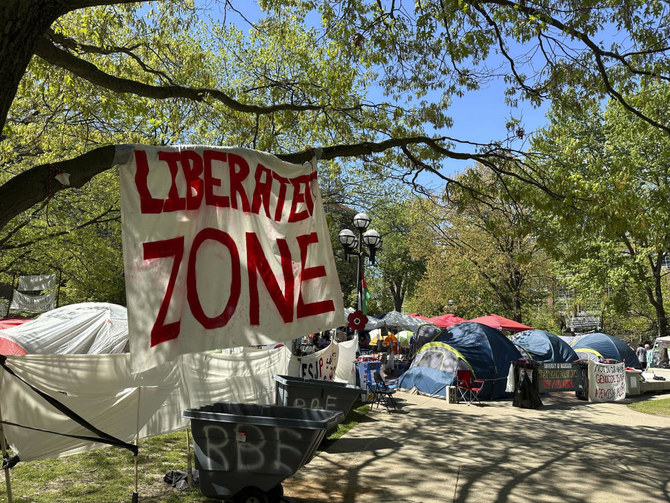
- Students booed and yelled “free Palestine” while the University of Utah president spoke Thursday night at commencement
- “People can exercise their First Amendment rights without disrupting or creating fear,” Burdick said of protesters
MICHIGAN, USA: With student protests over the Israel-Hamas war disrupting campuses nationwide, several major universities are intent on ensuring that commencement ceremonies — joyous milestones for graduates, their families and friends — go off without a hitch this weekend.
It won’t be easy. Colleges are hiring extra security, screening attendees at venues and emphasizing that significant disruptions by pro-Palestinian protesters won’t be tolerated. At the same time, they’re pledging to honor free-speech rights by designating protest zones.
Students booed and yelled “free Palestine” while the University of Utah president spoke Thursday night at commencement. He paused his speech to ask those who were protesting to leave or be removed. Outside the ceremony in Salt Lake City, a group of about 50 people were rallying. There was one arrest.
“Milestone is a perfect word,” said Ken Burdick of Tampa, Florida, describing his daughter’s graduation Saturday at the University of Michigan. He hopes the big day goes untarnished.
“People can exercise their First Amendment rights without disrupting or creating fear,” Burdick said of protesters.
Here’s how some schools are planning to balance things:
UNIVERSITY OF MICHIGAN
More than 8,000 graduates — and 63,000 spectators — are expected for Saturday’s festivities inside Michigan Stadium, known as The Big House. There will be security screening, and disruptive protesters could be subject to removal. Public safety officers and staff who commonly monitor major events, such as fall football games, will be present. Author and historian Brad Meltzer is the featured speaker.
In March, an annual event recognizing students with high academic achievement ended early when pro-Palestinian protesters raised provocative signs and drowned out remarks by President Santa Ono, yelling, “You are funding genocide!” The university subsequently drafted a policy that could lead to student expulsions and staff dismissals for event disruptions, though it hasn’t been finalized.
“It was painful for everyone who had gathered — and especially so for members of our Jewish community,” Ono said two days later.
Protesters have erected dozens of tents on the Diag, a historic space for campus activism more than a mile away from the stadium. They’re demanding that Michigan cut financial ties with companies connected to Israel. There has been no effort to break up the encampment and no arrests.
“We respect and uphold the principles of free expression, and also recognize that no one is entitled to disrupt university activities,” Laurie McCauley, Michigan’s chief academic officer, said in an email to students and staff about commencement.
Blake Richards, 25, is earning a bachelor’s degree in biochemistry. Richards plans to be at the football stadium Saturday after participating in a smaller ceremony Thursday for chemistry students.
“It could take away some great feelings, muddle them,” Richards said of any disruptions. “But truth be told, I’m not bothered. I know others have different opinions; I’m just happy to be here.”
INDIANA UNIVERSITY
The Bloomington, Indiana, campus is designating protest zones outside Skjodt Assembly Hall and Memorial Stadium, where ceremonies will be held Friday for graduate students and Saturday for undergraduates. Nearly 10,000 students are eligible to attend.
A social media post circulating on Instagram urged protesters to wear “your keffiyeh along with your cap and gown” and walk out during Saturday’s remarks by President Pamela Whitten.
Roughly 20 tents set up by protesters remained in place this week in an area known as Dunn Meadow, a mile from the stadium. Dozens of protesters have been arrested there recently, according to the Indiana Daily Student.
Maya Wasserman, a 22-year-old senior in management who is Jewish, said she and her family feel uncomfortable about the prospect of pro-Palestinian protests disrupting commencement. She expressed special concern for her mother and grandmother, who are Israeli.
“It’s unfortunate because we want this event to be about graduating, not politics,” Wasserman said.
At Dunn Meadow, students in lawn chairs or on blankets worked on their final assignments. Jessica Missey, a 20-year-old protester and senior, said she boycotted final exams; some professors, she said, simply canceled them. She has enjoyed the camaraderie at the encampment.
“Commencement is kind of just taking almost a little sidestep for me,” said Missey.
NORTHEASTERN UNIVERSITY
A week after police arrested nearly 100 protesters at Northeastern University, the school is holding its commencement exercises Sunday at Fenway Park, home of the Boston Red Sox, for the fourth consecutive year.
The venue will help security officials monitor the crowd and limit what people can bring. Signs, banners, balloons and full-size flags are prohibited in the stadium, along with most bags. Renata Nyul, vice president for communications, said public safety staffing will be strengthened.
All those entering Fenway will need to pass through metal detectors. About 50,000 graduates, family and friends are expected.
Northeastern is one of several universities in the Boston area that have had pro-Palestinian encampments. Some have let the protests continue, though Northeastern’s camp was broken up.
“While we realize that issues in the world prompt passionate viewpoints, the focus this weekend should be on our graduates and their remarkable achievements,” Nyul said.



